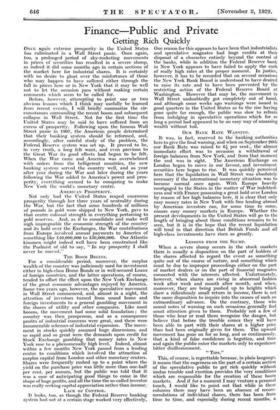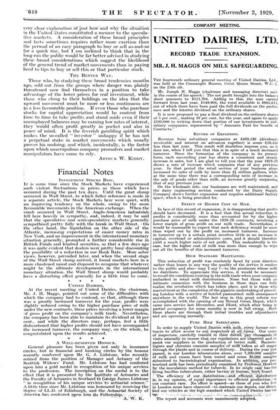Finance Piiblic and Private
Getting Rich Quickly
has culminated in a Wall Street panic. Once again, too, a prolonged period of sky;rocketing movements in prices of securities has resulted in a severe slump, as indeed it did some months ago in certain sections of the market here for industrial shares. It is certainly with no desire to gloat over the misfortunes of those who may happen to have suffered either through the fall in prices here or in New York that it may be well not to let the occasion pass Without making certain comments which Seem to be Called for.
Before, however,- attempting to .point one or two obvious lessons which I think may usefully be learned from recent events, I will ,briefly summarize the cir- cumstances surrounding the recent boom and subsequent collapse in Wall Street. Not for the first time the United States may be said to have suffered from an excess of prosperity. Following upon the famous Wall Street panic in 1907, the American people determined that their banking system should be reformed, and, accordingly, after_ careful study of the problem, - the Federal Reserve system was set up. It proved to be, in very truth, a long felt want, and even previous to the Great War its good effects had begun to be felt. When the War came and America was overwhelmed with orders from the belligerent countries, the new banking system served the country well, and as year after year during the War and later during the years following the War added to America's power and pros- perity, everything seemed to be conspiring to make New York the world's monetary centre.
AMERICAN PROSPERITY.
Not only -had the United States reaped enormous prosperity through her three years of neutrality during the War, but the fact that some hundreds of millions of pounds in gold were shipped to New York, gave to that centre colossal strength in everything pertaining to gold reserves. And, as if to consolidate and make well nigh impregnable the economic strength of the country and its hold over the Exchanges, the War contributions from Europe involved annual payments to America of something like £40,000,000 to £50,000,000. Our Atlantic kinsmen might indeed well have been constrained like the Psalmist of old to say, "In my prosperity I shall never be moved."
THE Boom BEGINS.
For a considerable period, moreover, the surplus wealth of the country was judiciously used for investment either in high-class Home Bonds or in well-secured Loans of foreign countries, and the latter operations, of course, tended to offset the effect upon the New York Exchange of the great economic advantages enjoyed by America. Some two years ago, however, the speculative movement in Wall Street commenced, and, almost in a night, the attention of investors turned from sound home and foreign investments to a general gambling movement in the shares of utility and other companies. Like most booms, the movement had some solid foundation ; the country was then *prosperous, and as a consequence profits of industrial concerns were great, and there were innumerable schemes of industrial expansion. The move- ment in stocks quickly assumed huge dimensions, and so rapid and so great were the demands upon credit for Stock Exchange gambling that money rates in New York rose to a phenomenally high level. Indeed, almost within a few months New York passed from a lending centre to conditions which involved the attraction of surplus capital from London and other monetary centres. Shares were frequently rushed up to a point where the yield on the purchase price was little more than one-half per cent, per annum, but the public was told that it: was a case of anticipating good things to come in the shape of huge profits, and all the time the so-called investor; was really seeking capital appreciation rather than income.'
LACK OF CONTROL.
It looks, too, as though the Federal Reserve banking system had not at a certain stage worked very effectively._ ONCE again extreme prosperity in the United States. One reason for this appears to have been that industrialists and speculative magnates had huge credits at their disposal of a character entirely beyond the control of the banks, while in addition the Federal Reserve bank in New York appears to have failed to apply the curb of really high rates at the proper moment. In justice, however, it has to be recorded that on several occasions the New York Bank Board is understood to have desired to raise its rate and to have been prevented by the restricting action of the Federal Reserve Board at Washington. However that may be, the movement in Wall Street undoubtedly got completely out of hand, and although some weeks ago warnings were issued in good quarters in the United States as to the rise having gone quite far enough, the public was slow to refrain from indulging in speculative operations which for so long a period had appeared to be an easy way of amassing wealth without toil.
OUR BANK RATE WARNING. '
It was, in fact, reserved to the banking _authorities here to give the final warning;and when on September 26th our Bank Rate was raised to 6f per cent.; the almost immediate effect was to occasion a withdrawal of foreign balances from New York, and froMthat moment the end was in sight. The American Exchange on London began to move in our favour, and investment securities here began to rise. It was quickly perceived here that the liquidation in Wall Street was absolutely necessary if the international monetary situation was to become normal once again. With Europe heavily mortgaged to the States in the matter of War indebted- ness and with France possessing a great hold over London by reason of her high balances here, it is clear that only easy money rates in New York with free lending abroad by American investors can, for some time to come, ensure easy money markets in Europe. Whether the present developments in the United States will go to the length of bringing about those conditions remains to be seen, but it is in the hope that the recent liquidation will tend in that direction that British Funds and all high-class investments have risen so greatly.
LESSONS FROM THE SLUMP.
When a severe slump occurs in the stock markets there is usually a disposition on the part of holders of the shares affected to regard the event as something quite out of the course of nature, and something which must be due to improper proceedings either on the part of market dealers or on the part of financial magnates connected with the interests affected. Unfortunately, however, when shares are rising in abnormal fashion week after week and month after month, and when, moreover, they are being pushed up to heights which show a ridiculously small return in income, there is not the same disposition to inquire into the causes of such an extraordinary advance. On the contrary, those who sound notes of warning on such occasions generally find scant attention given to them. Probably not a few of those who hear or read them recognize the danger, but believe that before the trouble comes they will have been able to part with their shares at a higher price than had been originally given for them. The upward movement has gone on for so long, and so continuously, that a kind of false confidence is begotten, and time and again the public enter the markets only to experience bitter disillusionment.
" TIPS."
This, of course, is regrettable because, in plain language, it means that the eagerness on the part of a certain section of the speculative public to get rich quickly without undue trouble and exertion provides the very conditions Which are responsible for the creation of these boom markets. And if for a moment I may venture a personal touch, I would like to point out that' while in these columns there may have been an absence of recom- mendations of individual shares, there has been from time to time, and especially during recent months, a %Try clear eXplanition of just hOW-iiiid WhY Attila-lion in the United states constituted a menace to the specula- tive markets. A consideration of these broad principles and facts sometimes requires rather more exertion than the perusal of an easy paragraph to buy or sell so-and-so- for a quick rise, but I am Maimed to think that in the tong run the public would be far better advised in studying these broad considerations which suggest the likelihood Of the general trend of market movements than in paying heed to tips to buy Or sell this or that particular stock.
TifE BETTER WAY.
Those who, by studying these broad tendencies months ago, sold out from the groups where danger was plainly threatened -now . find themselves in a .position to take advantage of the lower prices for real investment, while those who clung to their holdings on the idea that the upward movement must ,be more or less continuous are in a less favOurable position. If even those Who purchase Stocks for capital appreciation would be content from iime to. time to take profits and stand aside .even if their unemployed balances may be earning low rates of interest, they wcitilcl often profit greatly in pocket and also in Peace of Mind. It is the feverish 'gambling spirit which makes the so-called " investor " unhappy if he has not a perpetual stake in market movements .which usually proves his undoing, and Which; incidentally, is the factor upon which unscrupulous company promoters and market manipulators- have come to rely. • ARTHUR W. KIDDY.









































 Previous page
Previous page